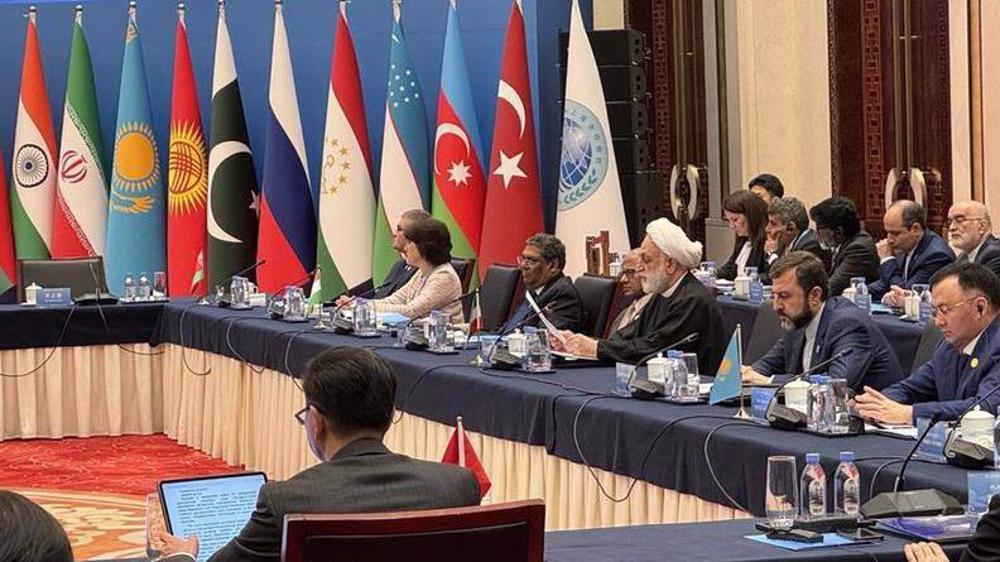
Iran’s Judiciary chief has proposed eight strategies to bolster legal and judicial cooperation among members of the Shanghai Cooperation Organization (SCO) to counter worldwide challenges.
Gholamhossein Mohseni-Eje’i addressed the opening of the 20th Meeting of Heads of Judicial Systems of SCO member states in Hangzhou, China on Wednesday, where he touched on challenges facing the world community.
The gathering, he said, is an excellent opportunity to expand legal and judicial cooperation among SCO members and adopt a “pragmatic approach” to the challenges.
“The SCO judicial meeting is held at a time when the world faces serious challenges such as unilateralism, criminal use of communication and information technologies, terrorism, human rights violations, threats to regional and international peace and security, and organized crime,” Mohseni-Eje’i said.
“The gathering of the top judicial authorities of SCO member states provides a suitable platform for friendly discussions on legal and judicial cooperation and adopting a pragmatic, constructive, and serious approach to interaction and collaboration.”
The Iranian Judiciary chief also touched on the threat posed by terrorist groups to international peace and security.
“Terrorism and the actions of terrorist groups, which threaten international peace and security, including in some SCO member states, have claimed the lives of more than 23,000 innocent people in the Islamic Republic of Iran over the past four decades, martyring them.
“The criminal justice systems of SCO member states must closely cooperate to prosecute and punish these criminals and their supporters,” he said.
In addition to terrorism, some SCO member states are subject to unilateral sanctions by certain countries claiming to champion human rights, Mohseni-Eje’i said.
“The imposition and enforcement of these sanctions are in clear violation of international law, the UN Charter, and various human rights, including the right to life, education, health, development, and welfare.
“Therefore, SCO member states must not only enhance their economic and commercial cooperation to counter sanctions but also prioritize legal and judicial pursuits against those imposing and enforcing sanctions, as well as support for the victims of sanctions,” he said.
Mohseni-Eje’i said “the genocide and war crimes of the Zionist regime, which began in October 2023, continue unabated” in the Gaza Strip.
“According to reports, the number of martyrs from these crimes exceeds 51,000, with over 116,000 injured. Over 70% of the victims are women and children, and two million Gaza residents have faced forced displacement.”
Mohseni-Eje’i said Gaza’s critical infrastructure has been completely destroyed, and no place — hospitals, schools, mosques, or historical sites — is immune from the regime’s aggression and destruction.
“The perpetrators of these crimes, despite being pursued by the international criminal justice system, freely travel to certain countries. The Zionist regime’s crimes, which blatantly violate human rights and humanitarian law, are unfortunately fully supported by these countries,” he added.
The eight strategies proposed by the Iranian Judiciary chief are as follows:
1- Strengthening judicial cooperation in combating transnational crimes by establishing joint mechanisms, such as creating a “judicial information-sharing platform” among member states to expedite the prosecution of criminals and forming a joint task force to counter drug trafficking networks.
2- Harmonizing laws to combat terrorism by developing legal frameworks for prosecuting terrorists and preventing their misuse of cyberspace.
3- Developing judicial diplomacy in cybercrime by forming a joint cyber committee to establish standards for collecting digital evidence and conducting joint exercises to simulate cyberattacks and judicial responses.
4- Reducing commercial disputes by establishing an “SCO International Arbitration Center” to address economic disputes.
5- Combating human trafficking and supporting victims by strengthening protective laws, cooperating on criminal extradition, creating a shared database on human trafficking groups, and providing victim rehabilitation programs with the participation of NGOs.
6- Protecting the environment and addressing cross-border environmental crimes, such as waste trafficking and water pollution, by adopting a joint protocol for prosecuting environmental crimes and establishing a monitoring network for violations in border areas.
7- Exchanging experience in smartening judicial systems to improve judicial efficiency using modern technologies, through holding annual summits on digital transformation in judicial systems and creating an online training platform for judges on information technology.
8- Strengthening dialogue among judicial systems to promote mutual understanding of legal systems by establishing an “SCO Legal Education and Research Center” to conduct training courses for judges and police on emerging crimes, perform comparative studies, and publish a joint journal on legal challenges.
In July 2023, the Shanghai Cooperation Organization officially approved Iran’s full-fledged membership in the organization.
The SCO is one of the world’s largest regional organizations, accounting for around one-third of the global Gross domestic product (GDP), roughly 40 percent of the world’s population, and nearly two-thirds of the entire Eurasian landmass.
This post was originally published on this site be sure to check out more of their content.








